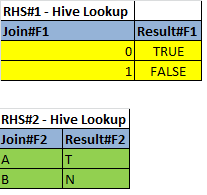The best way to solve this problem (which I can think off) is to modify your smaller dataset. You can add a new field (F1DecidingFactor) to the smaller dataset. The value of F1Result can should like:
Sudo code
if F1DecidingFactor == "Yes" then
F1Result = ACTUAL_VALUE
else
F1Result = "N/A"
Result Table
|F1#Join|F1#Result|F1#DecidingFactor|
| Yes| 0| True|
| Yes| 1| False|
| No| 0| N/A|
| No| 1| N/A|
You can do above via cascading as well.
After this, you can do your map side join.
If modifying smaller dataset is not possible, then I have 2 options to get the problem solved.
Option 1
Add new fields to your small pipes which is equivalent to you deciding factor (i.e. F1DecidingFactor_RHS = Yes). Then include it to your join criteria. Once your join is done, You will have values to only those rows where this condition is matching. Otherwise it will be null/blank. Sample code:
Main Class
import cascading.operation.Insert;
import cascading.pipe.Each;
import cascading.pipe.HashJoin;
import cascading.pipe.Pipe;
import cascading.pipe.assembly.Discard;
import cascading.pipe.joiner.LeftJoin;
import cascading.tuple.Fields;
public class StackHashJoinTestOption2 {
public StackHashJoinTestOption2() {
Fields f1Input = new Fields("F1Input");
Fields f2Input = new Fields("F2Input");
Fields f1Join = new Fields("F1Join");
Fields f2Join = new Fields("F2Join");
Fields f1DecidingFactor = new Fields("F1DecidingFactor");
Fields f2DecidingFactor = new Fields("F2DecidingFactor");
Fields f1DecidingFactorRhs = new Fields("F1DecidingFactor_RHS");
Fields f2DecidingFactorRhs = new Fields("F2DecidingFactor_RHS");
Fields lhsJoinerOne = f1DecidingFactor.append(f1Input);
Fields lhsJoinerTwo = f2DecidingFactor.append(f2Input);
Fields rhsJoinerOne = f1DecidingFactorRhs.append(f1Join);
Fields rhsJoinerTwo = f2DecidingFactorRhs.append(f2Join);
Fields functionFields = new Fields("F1DecidingFactor", "F1Output", "F2DecidingFactor", "F2Output");
// Large Pipe fields :
// F1DecidingFactor F1Input F2DecidingFactor F2Input
Pipe largePipe = new Pipe("large-pipe");
// Small Pipe 1 Fields :
// F1Join F1Result
Pipe rhsOne = new Pipe("small-pipe-1");
// New field to small pipe. Expected Fields:
// F1Join F1Result F1DecidingFactor_RHS
rhsOne = new Each(rhsOne, new Insert(f1DecidingFactorRhs, "Yes"), Fields.ALL);
// Small Pipe 2 Fields :
// F2Join F2Result
Pipe rhsTwo = new Pipe("small-pipe-2");
// New field to small pipe. Expected Fields:
// F2Join F2Result F2DecidingFactor_RHS
rhsTwo = new Each(rhsTwo, new Insert(f1DecidingFactorRhs, "Yes"), Fields.ALL);
// Joining first small pipe. Expected fields after join:
// F1DecidingFactor F1Input F2DecidingFactor F2Input F1Join F1Result F1DecidingFactor_RHS
Pipe resultsOne = new HashJoin(largePipe, lhsJoinerOne, rhsOne, rhsJoinerOne, new LeftJoin());
// Joining second small pipe. Expected fields after join:
// F1DecidingFactor F1Input F2DecidingFactor F2Input F1Join F1Result F1DecidingFactor_RHS F2Join F2Result F2DecidingFactor_RHS
Pipe resultsTwo = new HashJoin(resultsOne, lhsJoinerTwo, rhsTwo, rhsJoinerTwo, new LeftJoin());
Pipe result = new Each(resultsTwo, functionFields, new TestFunction(), Fields.REPLACE);
result = new Discard(result, f1DecidingFactorRhs);
result = new Discard(result, f2DecidingFactorRhs);
// result Pipe should have expected result
}
}
Option 2
If you want to have default value instead of null/blank, then I would suggest you do the HashJoin first with default Joiners followed by a function to update tuples with appropriate values. Something like:
Main Class
import cascading.pipe.Each;
import cascading.pipe.HashJoin;
import cascading.pipe.Pipe;
import cascading.pipe.joiner.LeftJoin;
import cascading.tuple.Fields;
public class StackHashJoinTest {
public StackHashJoinTest() {
Fields f1Input = new Fields("F1Input");
Fields f2Input = new Fields("F2Input");
Fields f1Join = new Fields("F1Join");
Fields f2Join = new Fields("F2Join");
Fields functionFields = new Fields("F1DecidingFactor", "F1Output", "F2DecidingFactor", "F2Output");
// Large Pipe fields :
// F1DecidingFactor F1Input F2DecidingFactor F2Input
Pipe largePipe = new Pipe("large-pipe");
// Small Pipe 1 Fields :
// F1Join F1Result
Pipe rhsOne = new Pipe("small-pipe-1");
// Small Pipe 2 Fields :
// F2Join F2Result
Pipe rhsTwo = new Pipe("small-pipe-2");
// Joining first small pipe.
// Expected fields after join:
// F1DecidingFactor F1Input F2DecidingFactor F2Input F1Join F1Result
Pipe resultsOne = new HashJoin(largePipe, f1Input, rhsOne, f1Join, new LeftJoin());
// Joining second small pipe.
// Expected fields after join:
// F1DecidingFactor F1Input F2DecidingFactor F2Input F1Join F1Result F2Join F2Result
Pipe resultsTwo = new HashJoin(resultsOne, f2Input, rhsTwo, f2Join, new LeftJoin());
Pipe result = new Each(resultsTwo, functionFields, new TestFunction(), Fields.REPLACE);
// result Pipe should have expected result
}
}
Update Function
import cascading.flow.FlowProcess;
import cascading.operation.BaseOperation;
import cascading.operation.Function;
import cascading.operation.FunctionCall;
import cascading.tuple.Fields;
import cascading.tuple.TupleEntry;
public class TestFunction extends BaseOperation<Void> implements Function<Void> {
private static final long serialVersionUID = 1L;
private static final String DECIDING_FACTOR = "No";
private static final String DEFAULT_VALUE = "N/A";
// Expected Fields: "F1DecidingFactor", "F1Output", "F2DecidingFactor", "F2Output"
public TestFunction() {
super(Fields.ARGS);
}
@Override
public void operate(@SuppressWarnings("rawtypes") FlowProcess process, FunctionCall<Void> call) {
TupleEntry arguments = call.getArguments();
TupleEntry result = new TupleEntry(arguments);
if (result.getString("F1DecidingFactor").equalsIgnoreCase(DECIDING_FACTOR)) {
result.setString("F1Output", DEFAULT_VALUE);
}
if (result.getString("F2DecidingFactor").equalsIgnoreCase(DECIDING_FACTOR)) {
result.setString("F2Output", DEFAULT_VALUE);
}
call.getOutputCollector().add(result);
}
}
References
This should solve your problem. Let me know if this helps.



